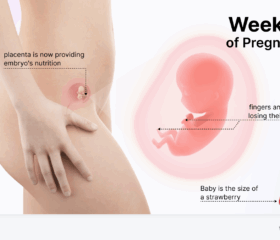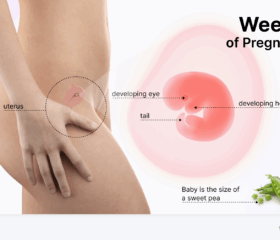Pregnancy Week by Week
9 Weeks Pregnant
Your baby is as big as a cherry.
1
inch
0.07
ounces
9 Weeks Pregnant: Common Symptoms, Your First Prenatal Visit, and Tips to Stay Healthy
Your baby is rapidly developing, with features like his eyelids and tooth buds taking shape. Before long, you’ll be watching his tiny heart beat on an ultrasound.
Read on to discover what’s happening with your baby’s development and how to navigate the changes in your own body in your 9th week.
Your baby’s development
Now just under an inch long (roughly the size of a strawberry or cherry) and weighing approximately 0.07 ounces, your little one has grown a lot.
This week marks a significant milestone—his last week as an embryo before he develops into a fetus. At this stage, your baby is undergoing big changes to his:
- Eyes: Your baby’s eyes and eyelids are forming. His eyes are becoming larger and gaining color. However, your baby’s eye color may change by the time he’s about a year old. And despite what you’ve heard, not all babies are born with blue eyes.
- Mouth: His tiny tooth buds are forming beneath his gums, laying the groundwork for the baby teeth that will emerge months after birth. Your baby now has a tongue with small taste buds.
- Limbs: His hands and feet are also taking shape, with grooves forming where fingers and toes will soon be.
- Organs: Inside, all his major organs—including the heart, brain, lungs, kidneys, and gut—are forming. The four chambers of your baby’s heart are now fully formed, and his heartbeat is starting. Your doctor may even be able to hear it with a fetal Doppler ultrasound.
- Genitals: The genitals are also beginning to form, although it will still be several weeks before an ultrasound can reveal your baby’s sex.
- Bones: Your baby’s bones are beginning to develop as well.
Though you can’t feel your baby move or kick yet, he’s started spontaneously wiggling and possibly even thumb-sucking.

Changes in your own body
Your hormonal activity (specifically, an increase in hCG, estrogen, and progesterone) will peak between the time you’re 8 weeks pregnant to 12 weeks pregnant. 1 These hormones increase the blood supply to your uterus, which is essential for your baby’s development.
This increase in hormonal activity may leave you feeling fatigued or emotionally volatile. You may also notice changes to your:
- Breasts: They’re already becoming larger, and they might feel achy or more sensitive.
- Waist: Your waist may start to thicken, and you might feel bloated. Many women find their regular clothes becoming uncomfortable at this stage.
- Skin: You might notice changes to your skin. One common condition is chloasma, also known as pregnancy mask, which causes darkened patches to appear.
Inside your body, your placenta has advanced enough to take over the production of the essential hormones for your baby’s growth.
How much weight should you gain in the first trimester?
How many pounds you should put on during your pregnancy depends on your pre-pregnancy body mass index (BMI). If you started with a normal BMI, your doctor may recommend gaining 1 to 5 pounds during the first trimester.
However, if you’re experiencing severe morning sickness (nausea), you may find that you’ve actually lost weight instead of gaining it. If you’re struggling to keep food down, try to eat smaller pregnancy-friendly snacks throughout the day rather than just a few large meals.
Common symptoms at 9 weeks pregnant
This week, you may notice a wide range of pregnancy symptoms. Again, most of these are the result of your hormone levels increasing. Common symptoms at this stage include: 2
- Fatigue: You may feel extremely tired as your hormones work overtime. This can leave you feeling drained, as well as impact your mental health.
- Nausea: The dreaded morning sickness often peaks during this stage. Despite the name, it can strike at any time.
- Frequent urination: You may find yourself constantly needing to pee due to increased blood flow and your growing uterus. This can happen day and night, which may disrupt your sleep.
- Mood swings: Your elevated levels of estrogen and progesterone may lead to you feeling irritable, anxious, or unexpectedly tearful. These changes may have already cropped up around week 6 to 10, which is usually when pregnancy mood swings start.
- Headaches: Similarly, your hormonal surges—coupled with a decrease in your blood sugar levels—can trigger headaches. If you’re dehydrated, which is a risk if you’re feeling nauseous, you’ll be especially prone to getting headaches while pregnant.
- Heightened sense of smell: Your sense of smell may be sharper, causing certain odors (e.g., from cooking, perfume, and cleaning products) to feel overwhelming or nauseating.
- Vaginal discharge: You may notice a thin, milky-white vaginal discharge when you’re pregnant, known as leukorrhea. This watery discharge during early pregnancy is normal and helps prevent infections by flushing out harmful bacteria. 3
- Gas and bloating: As your digestion slows down, you may have more gas and experience bouts of pregnancy-induced bloating.
You can keep track of your symptoms in your journal or a pregnancy tracker app in case you need to bring anything to your doctor’s attention. The best pregnancy trackers also include tips and educational content to help you manage your symptoms.
Is it normal to have no symptoms at 9 weeks?
Yes, it’s normal to be symptom-free at 9 weeks, and it isn’t a cause for alarm. If you’re not experiencing anything in the list above, you’re probably just one of the lucky ones, but it’s also OK to let your doctor know.
How to manage your symptoms at 9 weeks
As you navigate week 9 of your pregnancy, making small changes to your routine can make a big difference in your comfort and wellbeing. Here are a few tips to help you manage this stage:
Be mindful of what you eat
Try to eat nutritious snacks to keep your energy levels stable and manage your nausea. Healthy options include boiled eggs with whole-grain toast, hummus with veggie sticks, or pita bread with grated pasteurized cheese. Ginger and vitamin B6 are also effective home remedies for morning sickness.
Staying hydrated is equally important—aim for at least 8 glasses of water a day.
To minimize heartburn (which often starts early on in pregnancy), eat small, frequent meals throughout the day and avoid adding foods known to trigger symptoms to your pregnancy diet, such as spicy, greasy, or acidic dishes.
Prioritize your comfort
If your clothes are starting to feel snug, try comfier clothes, like:
- Leggings
- Loose dresses
- Pants with elastic waistbands
- Maternity wear
To cope with headaches, try placing a warm or cold compress on your forehead.
Stay moderately active
While it’s important to get enough rest, you should try to stay moderately active. Walking is a great way to get some exercise that doesn’t put too much strain on your body. Try to do this regularly, and remember to stay hydrated and wear comfortable shoes.
Focus on your mental wellbeing
Be kind to yourself during this demanding phase of your pregnancy. To manage your mood swings, focus on techniques like meditation or deep breathing.
Consider setting aside a few moments each day to engage in a (relaxing and stress-free!) hobby. You could start a journal or scrapbook about your pregnancy. Some moms even write letters to their babies. These are small practices, but they can keep you grounded and help you build a connection to your growing baby.
Household safety
Scope out your home for potential hazards. It’s important to avoid exposure to harmful chemicals in cleaning products, pesticides, or paint, so get your partner or a family member to help you.
Vaccinations
Make sure you’re up to date with your vaccinations. You can get the flu shot while pregnant, as well as the COVID-19 vaccine. They’re both safe to get while you’re expecting and will protect both you and your baby.
Note that certain other vaccines are unsuitable for pregnant women, including the measles, mumps, and rubella (MMR) vaccine. Speak with your doctor if you’re unvaccinated against rubella (although they probably checked when you got your first set of prenatal tests).
Your first prenatal visit: what to expect
You may be gearing up for your first pregnancy appointment, which you’re hopefully excited about. It’s okay if you’re a bit nervous, too, although it will probably be a very routine check.
During this appointment, your provider will perform various tests, including bloodwork to check your hormone levels, blood type, and overall health.
You may also have a pap smear to screen for cervical abnormalities and a urine test to check for infections and ensure your body’s protein levels are within the normal, healthy range.
Your provider may also perform a transvaginal pregnancy ultrasound. This involves inserting a very small probe into the vagina to get a clear view of your uterus, as your baby is still too small to be seen with a transabdominal ultrasound.
What can you see with an ultrasound at 9 weeks?
The ultrasound may reveal key features such as the gestational sac, yolk sac, and fetal pole. If the conditions are right, you might even see or hear your baby’s heartbeat for the first time.
Not only is it an unforgettable moment to finally hear your little one’s beating heart, but once his heartbeat is confirmed, the risk of all types of miscarriages drops significantly—typically to 2%–9%, depending on factors like your age and health history.
What if you’re pregnant with twins?
If your symptoms have been particularly strong, these could be early signs of twins. Your first prenatal visit will confirm this.
Learning that you’re expecting twins can be overwhelming. It’s natural to feel a mix of excitement and apprehension—after all, most people don’t plan on raising two babies at once!
Talk with your doctor about any adjustments you need to make in your prenatal care. You’ll also probably want to talk with your partner, family, or friends, and if you need additional support, look for a twin-focused parenting group in your area or online.
Final thoughts
As you approach the end of your first trimester, remember that many of the challenges you’re experiencing now will begin to ease in the weeks ahead. The second trimester is often when your energy levels improve and your symptoms subside, meaning you’ll be able to start enjoying your pregnancy.
In the meantime, follow the steps we’ve outlined to stay comfortable and healthy. As always, communicate openly with your doctor.
You’ve done great so far, and in just three more weeks, you’ll finish your first trimester. Give in to your cravings just this once. You deserve a reward!
Article Sources
- Nigerian Medical Journal. "Hormones in pregnancy" Retrieved June 23, 2025.
- Eunice Kennedy Shriver National Institute of Child Health and Human Development. "What are some common signs of pregnancy?" Retrieved June 23, 2025.
- Blue Cross and Blue Shield of Texas. "Vaginal Discharge" Retrieved June 23, 2025.







